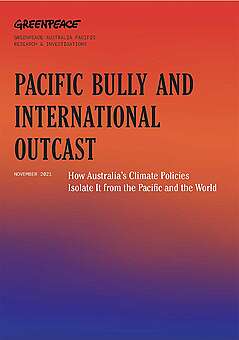How Australia’s Climate Policies Isolate It from the Region and the World

Australia is a climate laggard and is seen as such on the world stage.
Pacific Bully and International Outcast details the impacts of Australia’s climate position on its regional relations with Pacific island countries. It also assesses the wider impacts for Australia’s international diplomacy, reputation and trade if the Australian government continues to drag its feet on climate action.
In the course of this investigation, Greenpeace Australia Pacific interviewed 14 experts and four former political leaders – former President of Kiribati, Anote Tong, former Prime Minister of Tuvalu, Bikenibeu Paeniu, former Minister of Foreign Affairs for Vanuatu (and current Leader of the Opposition), Ralph Regenvanu, and former Minister of Foreign Affairs and Trade for Australia, Gareth Evans.
The investigation begins by uncovering Australia’s treatment of Pacific island countries during recent regional climate negotiations and in the lead up to the 2015 Paris Agreement (01: Australia: The Pacific Family’s Bully). It demonstrates how Australia’s climate policies affect the security and survival of the Pacific islands, and how Australia’s stubborn and coercive climate diplomacy has stymied regional climate action.
The investigation then uncovers the problems and pitfalls of Australian climate aid to the Pacific islands. It puts under the microscope the Australian government’s loudly advertised claim that Australia gives generous amounts of climate aid to the Pacific (02: Problems and Pitfalls of Australian Climate Aid). It finds that some of the most expensive projects tagged as ‘significantly focused, on climate adaptation in the Pacific islands have no link to climate change adaptation or improving the climate resilience of the Pacific. The lack of accuracy and transparency in the government’s climate aid reporting has led to a significant overestimation of how much funding Australia actually gives in climate aid to the Pacific islands.
Finally, the investigation details indirect and direct attempts by international allies and key trading partners such as the UK, US and EU to persuade the Australian government to increase its climate ambition (03: Out of Step with the Region and the World). It considers Australia’s reputational, soft power and economic losses if it continues to support and subsidise the fossil fuel industry. The investigation crunches the numbers on how other countries’ climate policies will affect Australia’s export market for coal and gas, showing what the decreased demand from countries with stronger climate policies will mean for the Australian economy. These findings provide a direct challenge to Prime Minister Scott Morrison’s recent claims that the mining sector is “absolutely critical to Australia’s future”, showing that developing countries will not come close to filling the demand gap left by countries with mid-century net zero targets.


